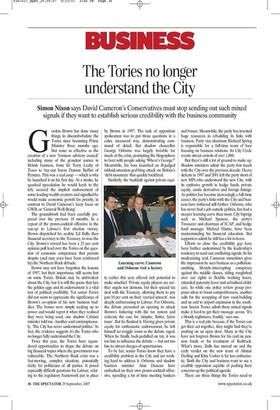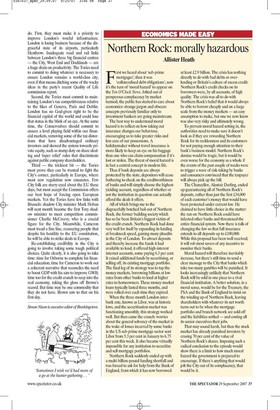The Tories no longer understand the City
Simon Nixon says David Cameron's Conservatives must stop sending out such mixed signals if they want to establish serious credibility with the business community Cordon Brown has done many things to discombobulate the Tories since becoming Prime Minister three months ago. But none so effective as the creation of a new 'business advisory council' including many of the grandest names in British business, from Sir Terry Leahy of Tesco to buy-out baron Damon Buffini of Permira. This was a real coup — which is why he launched it on his first day. At a stroke, he quashed speculation he would lurch to the left, secured the implicit endorsement of some leading wealth-creators and signalled he would make economic growth his priority, in contrast to David Cameron's fuzzy focus on GWB, or 'General Well-Being'.
The groundwork had been carefully prepared over the previous 18 months. In a repeat of the prawn-cocktail offensive in the run-up to Labour's first election victory, Brown dispatched his acolyte Ed Balls, then financial secretary to the Treasury, to woo the City. Brown's reward has been a 25 per cent opinion poll lead over the Tories on the question of economic competence that persists despite (and may even have been reinforced by) the Northern Rock debacle.
Brown may not have forgotten the lessons of 1997, but their importance still seems lost on some Tories. Britain may be ambivalent about the City, but it is still the goose that lays the golden eggs and its endorsement is a vital test of political credibility. Yet senior Tories did not seem to appreciate the significance of Brown's co-option of his new business buddies. The bosses were simply sucking up to power and would regret it when they realised they were being used, one shadow Cabinet minister told me. Another said contemptuously, The City has never understood politics.' In fact, the evidence suggests it's the Tories who no longer fully understand the City.
Twice this year, the Tories have squandered opportunities to shape the debate on big financial topics where the government was vulnerable. The Northern Rock crisis was a fast-moving, complex situation, potentially tricky for politicians of all parties. It posed especially difficult questions for Labour, relating to the regulatory framework put in place by Brown in 1997. The task of opposition spokesmen was to put those questions in a calm, measured way, demonstrating command of detail. But shadow chancellor George Osborne was largely invisible for much of the crisis, prompting the blogosphere to buzz with people asking 'Where's George?' Meanwhile, his boss launched an ill-judged tabloid-attention-grabbing attack on Britain's 'debt mountain' that quickly backfired.
Similarly, the backlash against private equity earlier this year offered rich potential to make mischief. Private equity players are neither angels nor demons, but their special tax deal with the Treasury, allowing them to pay just 10 per cent on their 'carried interest', was deeply embarrassing to Labour. For Osborne, the debate presented an opening to attack Brown's tinkering with the tax system and reiterate the case for 'simpler, flatter, fairer taxes'. But he flunked it. Having given private equity his enthusiastic endorsement, he left himself no wriggle room as the debate raged. When he finally back-pedalled on tax, it was too late to influence the debate — but not too late to attract charges of opportunism.
To be fair, senior Tories know they have a credibility problem in the City and are working hard to address it. Osborne and shadow business minister Alan Duncan have embarked on their own prawn-cocktail offensive, spending a lot of time meeting bankers and bosses. Meanwhile, the party has invested huge resources in rebuilding its links with business. Party vice-chairman Richard Spring is responsible for a full-time team of four focusing on business relations. Its City Circle events attract crowds of over 1,000.
But there's still a lot of ground to make up. Shadow ministers admit the party lost touch with the City over the previous decade. Heavy defeats in 1997 and 2001 left the party short of new MPs who understood the new City, with its explosive growth in hedge funds, private equity, exotic derivatives and foreign listings. As politics has become increasingly a full-time career, the party's links with the City and business have withered still further. Osborne, who has never had a job outside politics, has had a steeper learning curve than most. City bigwigs such as Michael Spencer, the party's Treasurer and chairman of ICAP, and hedge fund manager Michael Hintze, have been masterminding his financial education. But supporters admit he still has a lot to learn.
Efforts to close the credibility gap have been further undermined by the leadership's tendency to send out conflicting signals. In his modernising zeal, Cameron sometimes gives the impression he sees business as a pollutionemitting, lifestyle-interrupting conspiracy against the middle classes, riding roughshod over our rights to flexible working hours, extended paternity leave and subsidised childcare. So while one policy review group proposes ideas to boost competitiveness, another calls for the scrapping of new road-building and an end to airport expansion in the southeast. Senior Tories admit these mixed signals make it hard to get their message across. 'It's a bloody nightmare, frankly,' says one.
This is a real pity because, if the Tories can get their act together, they might find they're pushing on an open door. Many in the City have not forgiven Brown for his raid on pension funds or his treatment of Railtrack. What's more, Balls has moved on and the early verdict on the new team of Alistair Darling and Kitty Ussher is far less enthusiastic. Both the City and business want to see a credible opposition capable of pushing their concerns up the political agenda.
There are three things the Tories need to do. First, they must make it a priority to improve London's woeful infrastructure. London is losing business because of the disgraceful state of its airports, particularly Heathrow. Inadequate road and rail links between London's three big financial centres — the City, West End and Docklands — are a huge drain on productivity. The Tories need to commit to doing whatever is necessary to ensure London remains a world-class city, even if that means ditching some of the wacky ideas in the party's recent Quality of Life commission report.
Second, the Tories must commit to maintaining London's tax competitiveness relative to the likes of Geneva, Paris and Dublin. London has no God-given right to be the financial capital of the world and could lose that status in the blink of an eye. At the same time, the Conservatives should commit to ensure a level playing field within our financial markets, removing some of the tax distortions that have disadvantaged ordinary investors and skewed the system towards private equity, such as stamp duty on share-dealing and 'taper relief rules that discriminate against public company shareholders.
Third — the trickiest bit — the Tories must prove they can be trusted to fight the City's corner, particularly in Europe, where most new regulation now emanates. Few City folk are starry-eyed about the EU these days, but most accept the Commission offers our best hope of forcing open European markets. Yet the Tories have few links with Brussels: shadow City minister Mark Hoban will next month become the first Tory shadow minister to meet competition commissioner Charlie McCreevy, who is a crucial figure for the City. Meanwhile, Cameron must tread a fine line, reassuring people that despite his hostility to the EU constitution, he will be able to strike deals in Europe.
Re-establishing credibility in the City is going to involve taking some tough political choices. Quite clearly, it is also going to take time: time for Osborne to complete his financial education; time for Cameron to work out a coherent narrative that reconciles the need to boost GDP with his aim to improve GWB; time too for the credit crunch to seep into the real economy, taking the gloss off Brown's record. But time may be one commodity that they do not have. Brown saw to that on his first day.
Simon Nixon is arecutive editor of Breakingviews.
























































 Previous page
Previous page